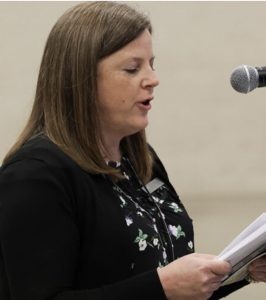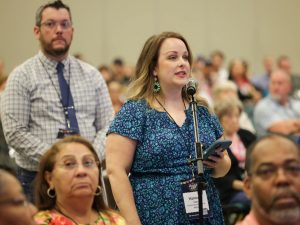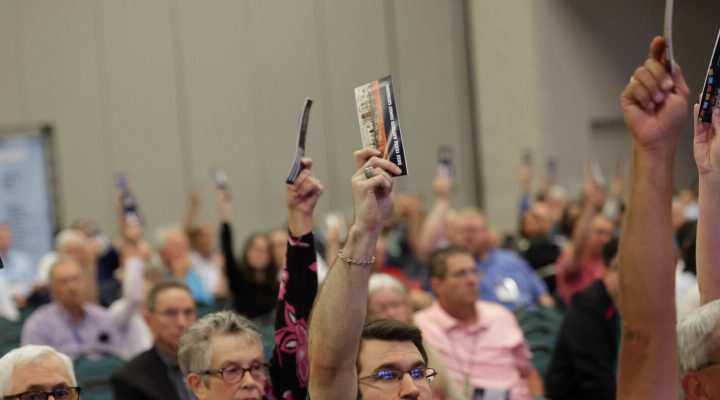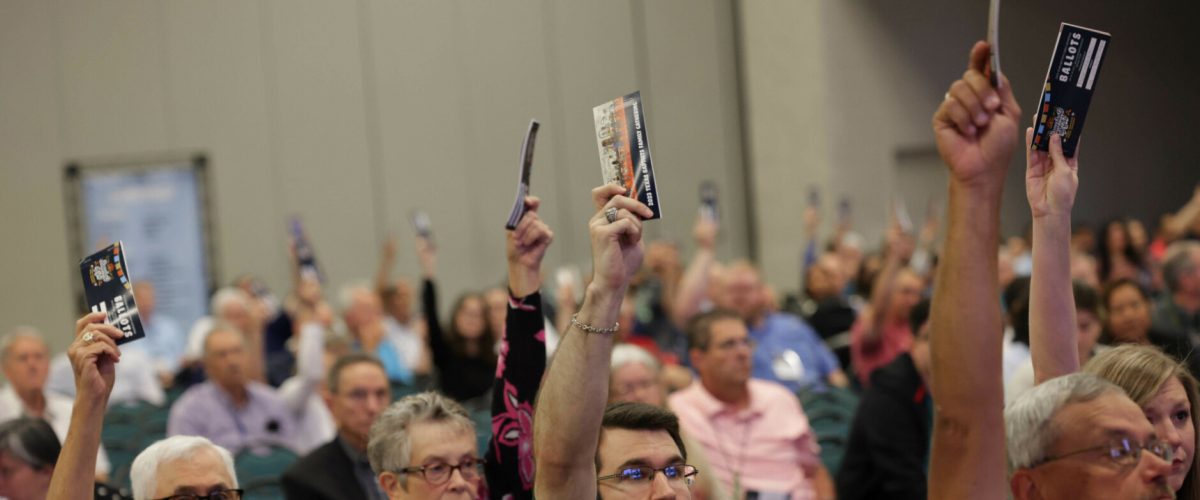The Baptist General Convention of Texas — once considered a supporter of women in ministry — declined to give full blessing to the idea when presented the opportunity at its annual meeting July 18.
Motions affirming women in ministry and calling for greater resourcing got watered down or withdrawn after initially being ruled of out of order. The two motions presented Texas Baptists an opportunity to break ranks with the Southern Baptist Convention, which last month took several actions to declare women may not serve in any capacity called “pastor” and may not preach in SBC churches.
In the end, the BGCT adopted a position less restrictive than the SBC but not as affirming as advocates for women in ministry wanted.
“In the end, the BGCT adopted a position less restrictive than the SBC but not as affirming as advocates for women in ministry wanted.”
Former BGCT Associate Executive Director Steve Vernon, who now lives in Belton, Texas, summarized this half-a-loaf-is-better-than-no-loaf philosophy during debate on an amended motion that eventually passed.
“Change happens slowly,” he said. While he personally favored the original motion with stronger language, the amended motion still “differentiates us from the SBC” and “moves us along,” he reasoned.
That alternative approach will allow more opportunities for women in Texas Baptist churches without alienating churches that believe like the SBC that women should not be pastors.
BGCT history
The BGCT is an autonomous body that voluntarily cooperates with the SBC. Churches that are aligned with both the state and national bodies typically send Cooperative Program offerings through the state convention to the national convention.

Meredith Stone (BGCT photo)
Previously, the BGCT also allowed churches to send money to the Cooperative Baptist Fellowship, a more progressive breakaway group from the SBC that fully affirms women in ministry. However, that option was ended under the previous state executive director, David Hardage, when CBF was determined to be too friendly to gay people — an assessment most gay Baptists would have disputed at the time.
His immediate predecessors, Charles Wade and Randel Everett, both were more open to the dual partnership option, but conservatives in the state had been pushing for exclusive alignment with the SBC. That was true even though the most conservative churches in Texas had formed their own state convention in 1998 — the Southern Baptists of Texas Convention — because they thought the BGCT had become too liberal and was not towing the line with the SBC’s “conservative resurgence.”
The BGCT and the Baptist General Association of Virginia were the two state conventions historically affiliated with the SBC that put up the most resistance to the conservative putsch in the late 20th century.
In recent years, that resistance has faded somewhat in Texas. Three key issues have driven that retreat — LGBTQ inclusion, women in ministry, and the definition of religious liberty. The SBC and a fair number of Texas churches and pastors — rural Texas is a bright red territory politically — have adopted the evangelical view that religious liberty should favor Christians. Opposition to abortion also has played a role in the political calcuations.
While the BGCT has taken strong stands against LGBTQ inclusion by its statements and actions — removing from fellowship multiple affirming congregations — it has walked a fine line on the issue of women in ministry. Some of the convention’s most prominent churches affirm at least the idea of women in ministry but not LGBTQ inclusion.
“One unanswered question with enormous implications is whether the SBC would be willing to break ties with an entire state convention.”
One unanswered question with enormous implications is whether the SBC would be willing to break ties with an entire state convention that in any way affirms women in pastoral or preaching ministries. Although some see that as a logical next step in the SBC’s quest for doctrinal purity, it would be an unprecedented and highly divisive action.
The two motions
It is in this context that two motions were made on the opening day of the BGCT annual meeting in McAllen July 17.
Meredith Stone, executive director of Baptist Women in Ministry and a member of Calvary Baptist Church in Waco: “I move that the Baptist General Convention of Texas affirm women in all ministry and pastoral roles, and that the BGCT Executive Board be instructed to have staff create programs, resources and advocacy initiatives to assist churches in affirming, appointing and employing women in ministerial and pastoral roles.”

Ellis Orozco (BGCT photo)
Ellis Orozco, former pastor and now member of First Baptist Church of Richardson: “I move that the Baptist General Convention of Texas uphold the autonomy of the local church to affirm a cooperating church’s authority to call women to congregational and vocational ministry as they, under the lordship of Jesus Christ and guidance of sacred Scripture, deem fit.”
BGCT President Julio Guarneri referred both motions to the Committee on the Annual Meeting for consideration at a business session the next morning.
When morning arrived, Matthew Richard, pastor of First Baptist Church in Llano and chair of the Committee on the Annual Meeting, announced the committee found both motions out of order.
Stone’s motion was out of order because it would violate Article 1, Section 2 of the BGCT Constitution, he said. That article says the state convention has no “ecclesiastical authority” over member churches, which are “sovereign.”
Orozco’s motion was out of order because it lacked a specific call to action, Guarneri said. Later, after an amended version of Stone’s motion was adopted, Orozco asked to rescind his motion.
The debate
While Stone said she believed her motion should not have been ruled out of order, she offered an amended version on Tuesday morning. The new version dropped the language that would “affirm women in all ministry and pastoral roles.”
Slatton suggested his version “still provides room for churches on both sides of the issue to cooperate together for the sake of the gospel of Jesus Christ.”
It also dropped the word “advocacy” from the original version to state: “I move that the Baptist General Convention of Texas Executive Board be instructed to have staff create programs, resources and initiatives to assist churches in affirming, appointing and employing women in ministerial and pastoral roles.”
The committee found that motion in order, but after floor debate, Dustin Slaton, pastor of First Baptist Church in Round Rock, offered an amended version: “That we request the BGCT Executive Board to resource BGCT staff to continue developing more strategies, resources and advocacy initiatives to assist churches in affirming, appointing and employing women in ministry and leadership roles.”
Slatton suggested his version “still provides room for churches on both sides of the issue to cooperate together for the sake of the gospel of Jesus Christ.”

Hannah Coe, pastor of Calvary Baptist Church in Waco, speaks to the amended motion. (BGCT photo)
Stone and other advocates for women in ministry, opposed the amendment. These allies said Baptist women in ministry are “hurting” because of the SBC’s actions and need a clear understanding of where the BGCT stands.
On the other hand, some argued for “male headship” just as the SBC now advocates.
Still others sought to find a way to avoid further division, seeking to “make space” for women in leadership while allowing room for those who oppose women in church leadership.
What’s next?
In response to the amended motion adopted by Texas Baptists, BWIM offered a statement:
“While BWIM is hopeful that the motion will provide measures of support for women ministering and leading in Texas, we are also grieved that the BGCT has communicated that women in pastoral roles of all kinds are not included among the support the BGCT offers. It was also not clear if women in pastoral roles who are targeted by the SBC will be supported by the BGCT.
“BWIM will join with Texas BWIM to continue advocating for the BGCT, as well as all Baptists, to do more to demonstrate full and complete affirmation for women. Women are not a secondary issue and are worthy of knowing that they have a home and value among Baptists.”
Truett Seminary weighs in
Where the BGCT lands on the issue of women in ministry will be of intense relevance to Baylor University’s George W. Truett Theological Seminary in Waco. Texas Baptist pastors and churches are primary constituents of the seminary, which officially endorses women for all ministry roles.
On July 12, just five days before the BGCT meeting began, Truett Seminary posted this message on its Facebook page: “From our inception, Baylor’s Truett Seminary has existed to equip God-called people for gospel ministry in and alongside Christ’s church by the power of the Holy Spirit. To this very day, we continue to encourage and affirm both women and men as they pursue and prepare for their God-given calling based upon their God-given gifting. From the faculty and staff we hire, roughly one-half of whom are women, to the ways by which we educate and advocate for our students, Truett remains committed to this noble, gospel pursuit.”
The posted included photos of 24 women, presumably alumni, faculty and staff.
As of July 18, the Truett Seminary website showed 21 full-time faculty members. Of that number, five are women.
Female alumni of Truett Seminary piled on the post to say the message does not match the reality they experienced. Here is a sampling:
Aurelia Davila Pratt: “Truett Seminary is my alma mater. It was, for a time, my home. For many years now, I have felt cast out of that community. … I don’t appreciate the dishonesty from the institution and its leadership. For one, women in lead teaching roles and women preaching at Truett are few compared with men. I had one female professor my entire four years at seminary and statistically, not much has changed. This is a problem for a school who markets itself on affirming women in ministry.”
Kyndall Rae Routhaus: “When I advocated alongside other graduates for equal representation of women preachers not on faculty but just to preach in chapel and provided them with a long list of qualified preachers. I was assured that they would take our request seriously. Only to check the chapel schedule the following semester to find two weeks out of the whole schedule were allotted to women preachers.”
Mary Alice Birdwhistell: “I was once told by leadership at my former seminary, ‘Of course we support women in ministry, but we can’t be “too” supportive. Otherwise, we might be seen as going down a slippery slope.’ In that moment, the façade had been broken, because supporting women in ministry means so much more than paying them lip service or only speaking out for women if/when it is safe, convenient or beneficial to you.”
Courtney Pace: “Friendly reminder that Nevertheless She Preached was founded because women of Truett asked Truett to publicly affirm women in ministry and Truett said they would not.”
The Truett-BGCT connection
Another Truett alum, Craig Nash of University Baptist Church in Waco, used social media to make the connection between Truett and the BGCT.
“Thirty years ago, Texas Baptists sought to distinguish themselves from Southern Baptists in allowing churches the autonomy to have women pastors at all levels of leadership,” he wrote. “Thirty years later, if you walk into a church associated with Texas Baptists, the chance you will encounter a woman in the pulpit is only marginally higher than it would have been back then. What does it matter that Texas Baptist churches have the autonomy to have women preachers if very few of them actually do?
“I know Truett doesn’t bear full responsibility for this, but as the flagship seminary for Texas Baptists, the question has to be asked: Why do most female alumni of BGCT’s flagship seminary who are called to preaching roles in churches more often than not have to look OUTSIDE the BGCT to find a church that will affirm their calling?”
The answer to that question, one respondent posted, is simple: Local church autonomy. Neither the BGCT nor Truett Seminary can force churches to hire female pastors.
Related articles:
Texas Baptists expel two more churches for welcoming LGBTQ Christians
What happened to Texas Baptists? Moderate churches shaken by perceived shift to the right
BGCT will not change its relationship with Baylor
Texas Baptists ‘affirm’ women while making gender an article of faith


